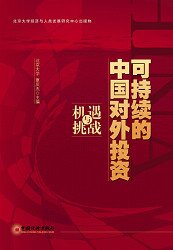The book ‘Sustainable Chinese Outward Foreign Direct Investment: Opportunities and Challenges’ was officially published in Beijing on 24 July 2012. The book was written and edited by the Center for Human and Economic Development Studies of Peking University alongside international development and humanitarian relief organization Oxfam. The book outlines the opportunities and problems Chinese corporations encounter when investing overseas, and provides solutions.

The book is a collection of the latest studies on outward foreign direct investment by important scholars of this field in China. The book placed special focus on the discussion outcomes of ‘Sustainable Chinese outward foreign direct investment: Opportunities and Challenges’ conference that was held at Peking University on 11 January 2012.
The book also discusses Professor Zhang Yunling’s (Director of the Chinese Academy of Social Sciences) strategic insights. He points out that Chinese outward foreign direct investment is facing many challenges despite rapid development in the area. In light of this, it is important to continue to explore new forms of outward foreign direct investment to ensure its sustainable development.
The book also talks about Professor Wang Yuesheng’s (Dean of the Department of International Economics and Trade at Peking University) theory: ‘model of large late-developing countries’. He argues that large late-developing countries’ namely, ‘BRICS’ (Brazil, Russia, India, China and South Africa) economic development, national power, economic strategies, foundation of investment, investment motivations, and such are significantly different from small- to medium-sized developing countries. Professor Wang Yuesheng goes on to further discuss the characteristics of “large late-developing countries’” outward foreign direct investment.
In the book, Professor Lu Xing from the GMS (Greater Mekong Sub-region) Study Center of Yunnan University also analyses the current situation among Chinese corporations in the Greater Mekong Sub-region in regards to corporate social responsibility. According to Professor Lu Xing, Chinese corporations are often criticised when “going out” (i.e. foreign investment). To improve companies’ corporate social responsibility, they need pressure from society. However, civil organisations in China currently lack power and the channels through which they can voice their concerns.
The book also includes case studies on Laos conducted by Oxfam. Mr. Titos Escueta from Oxfam attempted to figure out the trend and driving force behind agricultural industrialisation, and offer suggestions. He pointed out that opportunities and risks co-exist in agricultural industrialisation. That is, there is chance for both the government and farmers to increase their income through it, and infrastructure and agricultural productivity might be improved. However, industrialisation could force some farmers into market competition, and the environment might also be damaged to varying degrees. These problems need to be taken into consideration in the process of agricultural industrialisation.
In addition, Oxfam has commissioned research institutes to analyse the laws on Chinese outward foreign direct investment. This was done to improve the understanding of related laws and regulations among government officers, entrepreneurs, scholars and civil organisations, in order to promote the sustainable development of outward foreign direct investment.
In general, the book aims to promote communication between different parties and further explore related theories and studies in an attempt to provide constructive suggestions for the improvement of policies.
Information from the publisher
附錄:
本書目錄
第一章:關於中國對外投資戰略方式的思考
第二章:再論FDI的後發大國模式:基礎、優勢與條件
第三章:國家對外投資的資產配置策略與2012年美歐宏觀經濟形勢預測和投資策略
第四章:中國企業對外直接投資的類型分析
第五章:中非貿易投資關係的歷史與現狀
第六章:新形勢下中非經貿合作模式及政策建議
第七章:中國對非洲衛生援助投資的路徑分析
第八章:經濟地理分類視角下的中非貿易依存度及政策研究
第九章:海外投資企業的社會責任與公共外交的互動關係:以雲南海外投資企業為例
第十章:替代種植與我國周邊糧食安全的戰略
第十一章:老撾的農業產業化:趨勢與重要問題
第十二章:關於《中國境外投資法律及相關利益分析》的評論(一)
第十三章:關於《中國境外投資法律及相關利益分析》的評論(二)
第十四章:中國境外投資法律及相關利益分析(中文版)
第十五章:中國境外投資法律及相關利益分析(英文版)
